 |

Isoetes Species List
Isoetes acadiensis Kott. Acadian Quillwort
This is likely Isoetes mattaponica, which was not yet described when this page was constructed.
This is a rare plant in Virginia, restricted to freshwater tidal rivers. 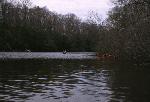
Habitat, Mattaponi River, Virginia. April 1997. (Bray)
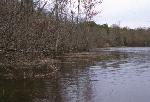
Habitat at high tide, Mattaponi River, Virginia April 1997. The quillworts are exposed at low tide. (Bray)
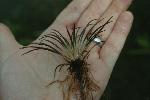
Plant. Walkerton, Virginia. July 1991.

Leaf cross section.
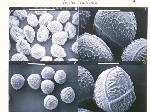
Megaspores and microspores.

Distribution.
Index Page
|
African Quillworts
The genus is poorly known in Africa, especially as regards relationships among species. Isoetes capensis from Stellenbosch, South Africa. September 1999


Isoetes capensis from Stellenbosch, South Africa. September 1999. Note the triangular shaped scales at the bases of the sporophylls

Isoetes capensis megaspores

Isoetes stellenbossiensis megaspores
Index Page |
Isoetes×altonharvillii Musselman
The hybrid between I. engelmannii and I. valida. 2n=22 
Habitat along Maury River, Rockbridge County, Virginia, September 1994.

The hybrid is the middle plant with I. valida to the left and I. engelmannii to the right.
Index Page
|
Allison's quillwort
This is a very rare undescribed hybrid, restricted to a few granite outcrops in Georgia. We believe this to be a hybrid between "I. piedmontana" and I. tegetiformans. 
Greene County, Georgia, April 1997. The larger hybrid is obvious against the background of I. tegetiformans.

Greene County, Georgia, April 1997.

Rootstock of Allison's quillwort. Compare this with I. tegetiformans. (Bray)
SEM pictures of microspores and megaspores. Note the complex surface of the microspores 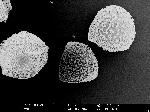
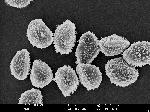
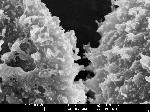
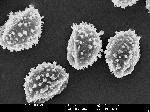
Chromosome figures of Allison's quillwort. 2n=22. (Bray) 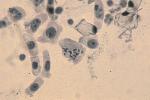
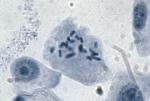
Index Page |
Isoetes appalachiana Brunton and Britton. Appalachian quillwort
Despite its name, this quillwort is not restricted to the Appalachians. 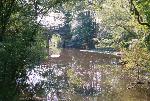
Habitat, Fountain Creek, Virginia. July 1998.

Habitat, Fountain Creek, Virginia. July 1998.

Plants at the margin of Fountain Creek, June 1998.

Plants at the margin of Fountain Creek, June 1998

Leaf in cross section.
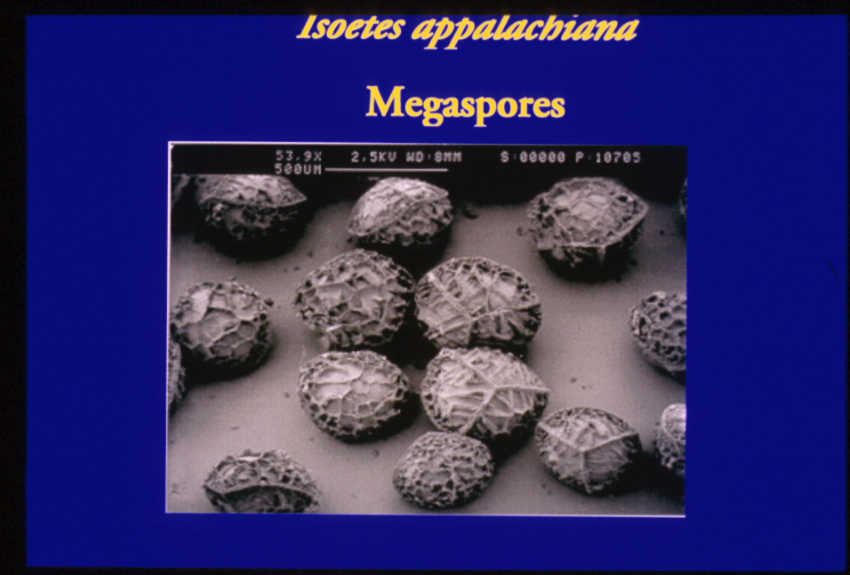
Megaspores.
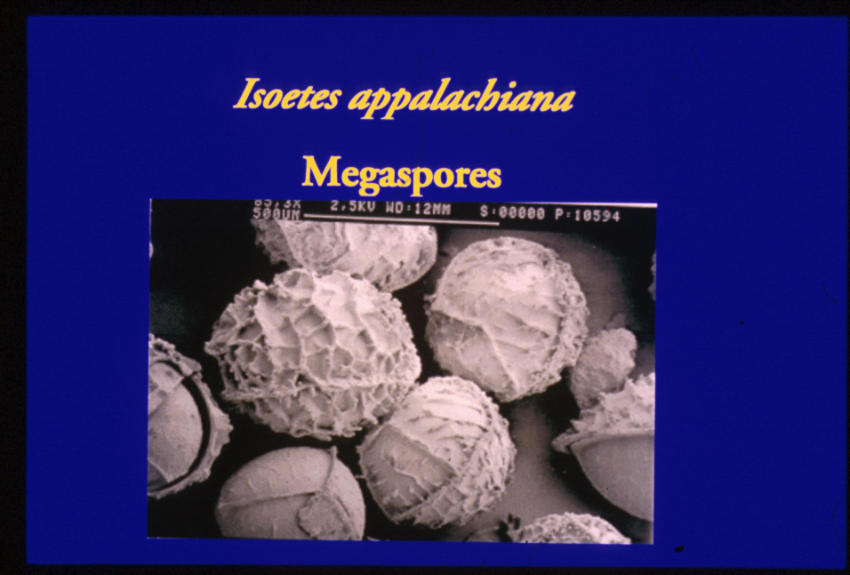
Megaspores.

Chromosomes from plants from Gadsden County, Florida. 2n=44.
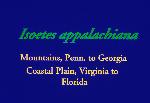
Distribution. All pictures by Rebecca Bray
Index Page |
Isoetes boomii Luebke.
Type locality in Laurens County, Georgia.
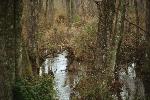

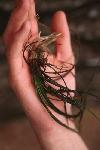
Plant. March 1997.
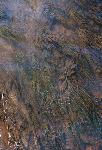
Plants in stream, February 1999. The population fluctuates and at this time dozens of plants were present.
Index Page |
Broxton quillwort This is a diminutive plant that occupies sandstone outcrops in southern Georgia. We are describing it as a new species. Figures 1-2. Habitat at Broxton Rocks Natural Area, north of Douglas, Georgia. March 1999.


Figures 3-4. Plants.
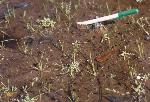
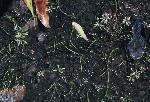
Index Page |
Isoetes butleri Engel.
This is a common quillwort in parts of the Eastern United States. However, it usually dries in the summer so is evident for only a small part of the year. Figures 3-4. Plant, Bowling Green, Kentucky, May 1994.


Index Page
|
Conecuh quillwort.
Conecuh County, in southern Alabama is one of those peculiar junctures in quillwort biogeography. In at least one area, a diploid, triploid, and tetraploid are found together. This diploid, usually referred to I. valida, has some features not typical of that taxon. The proverbial "further research" is needed. 
3. Plant. 
4. Megaspores.
Index Page |
Isoetes echinospora Durieu
Perhaps the most widely distributed quillwort in North America, the same taxon (or a very similar taxon) extends across northern Europe and Siberia. In the United States, it reaches its southern limit in the Delmarva peninsula of Delaware.

3. Habitat, Lake Joseph, Ontario, Canada 
4. Plant.
Index Page |
Isoetes georgiana Luebke
This hexaploid is much more widely distributed than once thought. Populations with thousands of plants determined as this species have been found.
Figures 1-2. Plants.   
3. Sporangium and velum. 
4. Chromosomes.
Figures 5-7. Megaspores. 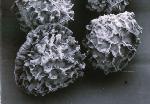 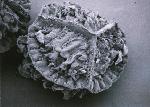 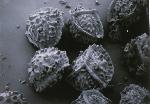
Index Page |
Isoetes hyemalis Brunton.
One of the most abundant quillworts in southern Virginia and perhaps elsewhere. 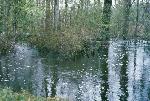
1. Habitat. Dinwiddie County, Virginia, February 1998. 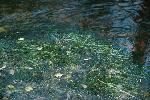
2. Large population in an intermittent stream, Dinwiddie County, Virginia, March 1994. 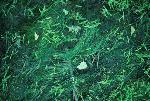
3. Plants. Dinwiddie County, Virginia, June 1994. 
4. Intrepid quillworters, February 1998. (Bray) 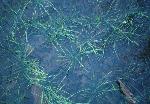
5. Plants, Harnett County, North Carolina, April 1990. This is the type locality.
6-7. Plants, margin of Chickahominy River, Providence Forge, Virginia, February 1999. (Bray) 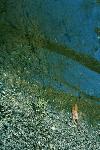
6 
7 
8. Leaf cross section. 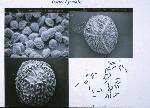
9. Spores and chromosomes.
10-11. Distribution. 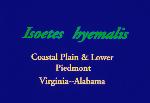
10. 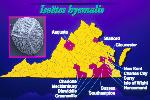
11. Index Page |
Isoetes louisianensis Thieret.
A federal endangered species, I. louisianensis is more common than thought. Several populations of thousands of individuals have been discovered in Mississippi. Its range is restricted to Louisiana and Mississippi.
Figures 1-3. Plants. Photographs by S. Leonard, March 1997. 
4. Megaspores. 
6. Plant with abscission caps removed.
Index Page |
Isoetes melanopoda Gay & Durieu.
Sometimes forming large populations, this quillwort is the only one in North America with weedy tendencies. The taxonomy of the group centered around I. melanopoda needs considerable work.
Figures 1-2. Habitat, Culpepper County, Virginia, March 1999. (Bray) 
1. 
2. 
3. Habitat, Mecklenberg County, North Carolina. 
4. Plants, Culpepper County, Virginia. (Bray) 
5. Base of plant showing phyllopodia. Culpepper County, Virginia, June 1992. 
6. Phyllopodia. (Bray). Index Page |
Isoetes melanospora Engelm.
There are two federally endangered rock outcrop quillworts in the Southeast: I. melanospora and I. tegetiformans. Isoetes melanospora is found on only a few outcrops.
Figures 1-2. Megaspores. 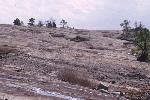
3. Mount Arabia, Georgia. Pools on top have one of the few populations. 
4. Mount Arabia, Georgia. March 1997. 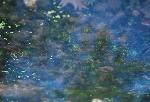
5. Camp Meeting Rock, Georgia. March 1996. Index Page |
Isoetes piedmontana (N. E. Pfeiffer) C. F. Reed.
What is I. piedmontana? Plants with this name have a diversity of spore ornamentation and have been reported to be both diploid and tetraploid.
Figures 1-2 Habitat, Stallings Crossroads, North Carolina. 
1. 
2. 
3. York County, South Carolina
Figures 4-7. Plants, Stallings Crossroads, North Carolina. 
4. 
5. 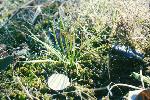
6. 
7. 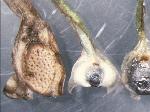
8. Sporophylls. Sporophyll from Stallings Cross Roads on left, others are from Georgia. 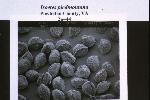
9. Microspores, Fines Mill Creek, Powhatan County, Virginia. 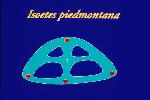
10. Leaf cross section.
11-12. Megaspores from Stallings Cross Roads. 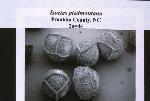
11. 
12.
Figures 13-14. Megaspores from Georgia. 
13. 
14.
Figures 15-16. Chromosome counts from Pinkston Rocks, Georgia plants. 
15. 
16. 
17. Distribution. All figures by Rebecca Bray
Index Page |
Isoetes riparia Engel. ex Braun.
Taxonomy of this "species" is tangled. Megaspores of this taxon are variable. At one time I. riparia was abundant in parts of the Chesapeake Bay.
Figures 11-12. Isoetes riparia in Alligator Creek, a bay of Alligator River, North Carolina, September, 1978. This population has been extirpated. 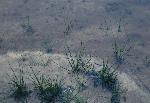
11. 
12. 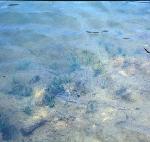
13. 
14. Megasporophyll. Index Page |
Isoetes tegetiformans Rury.
This diploid is the most distinctive quillwort in North America. Federally endangered, it grows on only a few outcrops in Georgia. Roots and dimorphic and typically unbranched. The rootstock is elongate, unlike any other North American quillwort although some Australian species have this feature. 
1. Habitat, Greene County, Georgia. 
2. Population in pool, Greene County, Georgia, March 1997. 
3. Plant, Greene County, May 1991. 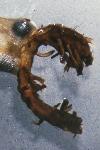
4. Rootstock. 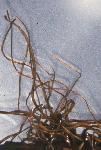
5. Roots.
Figures 6-7. Chromosomes 
6. 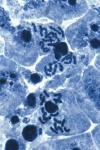
7. Index Page |
Isoetes valida (Engelm.) Clute.
Also known as I. caroliniana (A.A. Eaton) Luebke. Recent work has shown this species is more widely distributed than thought. A diploid, it could play a role in formation of polyploids. 
1. Habitat, Bass Lake, near Boone, North Carolina. (Bray) 
2. Glade Mill Pond, Blue Ridge Parkway, North Carolina. (Bray) 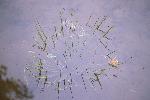
3. Large plants in Glade Mill Pond. (Bray) 
4. Plant at the margin of Bass Lake.(Bray) 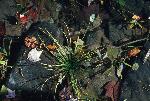
5. Plant, Bland County, Virginia. 
9. Plant, Butler County, Alabama, March 1997. 
10. Plant, Butler County, Alabama, March 1997.
Index Page |
Isoetes virginica N. E. Pfeiffer.
Yes, Virginia, there is a quillwort. But what quillwort is it? Recently discovered populations havestimulated new research into this tetraploid which, as currently circumscribed, is a Virginia endemic. 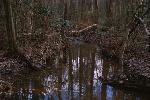
1. Amelia County, Virginia, March 1998. 
2. Plants, Amelia County, Virginia, March 1998. 
3. The Honorable Cap'n W. Carl Taylor examining plants, Amelia County, Virginia, March 1998. 
4. Leaf in cross section. 
5. Megaspores. 
6. Distribution. 
7. Amelia County, Virginia, site after clear-cut August 1999
Index Page |

|
 |
|